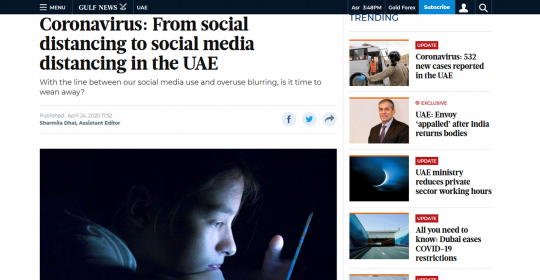
Coronavirus: From social distancing to social media distancing in the UAE – Dubai Psychologist, Dr Harry Horgan, in Gulf News
Ever since the global outbreak of coronavirus, screen time rules across homes have just disappeared into the woodwork. With e-learning, e-working, e-shopping and e-socialising becoming the buzzwords, the increasing time people began to spend on social media gained a new legitimacy.
But as psychologists and tech experts warn us, our need for social distancing could well extend to social media distancing too – if we don’t watch out. […]
Harry Horgan, clinical psychologist at the German Neuroscience Centre, agrees. “Data certainly indicates that people are using social media more than ever, both in terms of the percentage of the global population accessing social media, and in terms of the number of hours spent per day on social media sites.”
Horgan says it is important to consider functional impairment. “A question we might ask in this regard is does your social media use have negative effects on your work, leisure, relationships, health or sleep? If so, it can be worth examining. Social isolation is well-established as detrimental to mental health. In the current context, increased engagement with social media is probably to be expected and may serve as an important protective factor for our mental health when connecting face-to-face is impossible.” […]
Dos and don’ts to strike a balance online
Do keep personal information limited – Sharing is a large part of what it means to be on social media but it is important to be mindful and limit sharing information that is personal such as credit card details, phone numbers and main email addresses.
Do use messaging apps with end-to-end encryption – It is important to remember that not all social networking apps come equipped with end-to-end encryption. It is a good practice to use applications that offer end-to-end encryption
Don’t share main e-mail addresses and keep phone number private – Do not share your personal information with strangers over social networks as it can be misused
Don’t use public Wi-Fi to conduct important online activities – Public Wi-Fi networks usually do not encrypt traffic, which effectively means that cybercriminals on the same network can try to snoop on your traffic
The full and original article was published in Gulf News

